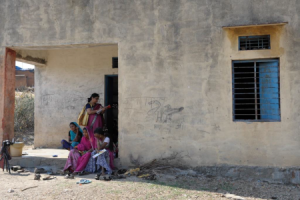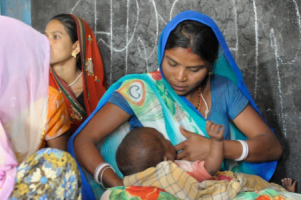On the 4th of every month, Seva Mandir holds an immunisation clinic in the village of Mohan Dungri in Girwa, south of Udaipur. The village is no more than a cluster of simple huts with a few goats. The camp is very well attended by pregnant women and mothers with young children.
They know they can count on the regular attendance of Seva Mandir-trained medical staff who administer inoculations and antenatal care competently and hygienically, and are also at their disposal for advice.
This is in contrast to many of the government-run clinics: we have heard in village meetings elsewhere that mothers can walk miles with ailing infants only to find that the doctor or nurse
has not turned up. 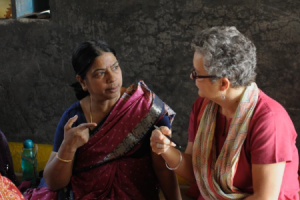
We are accompanied by Dr Kusum, a retired gynaecologist heading Seva Mandirs’ Health Unit.
The clinic takes place in a small two-roomed building, one room being used as a preschool for a dozen or so young children. One tiny girl who had been herding goats as we found our way to the clinic, was now sitting on the floor with her classmates in the smaller room.
In the other room, we found two female Traditional Birth Attendants (TBAs), two female Balsakhis (infant health advisors) and two male inoculation staff, all trained and equipped by Seva Mandir.
Dr Kusum keeps a close eye on the care being given as well as offering guidance and advice to young pregnant women and mothers.
In ones and twos, mothers arrive on foot carrying their children. Some have walked a considerable distance.
Over a couple of hours, the two men administered inoculations against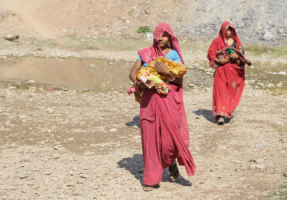
diphtheria, whooping cough, tetanus, measles and hepatitis, as well as oral polio vaccine to about 20 children.
The infants ranged from three months to a year, and before long the small room was ringing with cries as startled babies objected to the injections.
The mothers comforted their little ones by breastfeeding them.
As an incentive to bring children for immunization, mothers receive a kilogram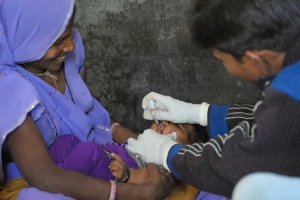
of lentils after each inoculation, and a set of stainless steel serving utensils when their child finishes the inoculation course.
Each child has a booklet covering their growth and their immunizations. Mothers sign with a thumb print to acknowledge their child’s treatment and receipt of their gifts.
The Balsakhis examine the children and give mothers advice on feeding (exclusively breast milk up till six months), introducing solids, and also help with advice on common ailments and contraception.
After the babes, it is the turn of the pregnant women, who are examined by the Traditional Birth Attendants. Their eyes, nails, abdomen, blood pressure and weight are checked and their urine tested, and they receive iron and folic acid tablets.
Slowly, mothers and children started to drift away safe in the knowledge that they are protected against many debilitating and potentially fatal diseases. A great job performed by competent and dedicated staff.


